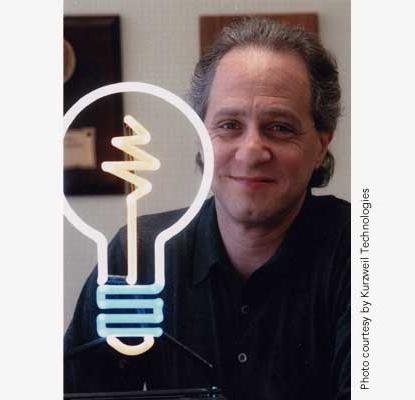Raymond Kurzweil
A futurist and pioneer of pattern recognition technologies, Raymond Kurzweil has enriched our society with inventions that improve the quality of life for disabled people, while also merging technology with the arts. Kurzweil, who invented the first reading machine for the blind, was awarded the $500,000 Lemelson-MIT Prize in 2001.
Other invention firsts of Kurzweil's include the first musical synthesizer—capable of reproducing the sounds of orchestral instruments and the first commercially marketed large vocabulary speech recognition system.
A native of Queens, NY, Kurzweil aspired to become an inventor since age five. By the time he was 15, he had built and programmed his own computer to compose original melodies—which even garnered him an appearance on the television show "I've Got a Secret."
In 1974, Kurzweil founded Kurzweil Computer Products, Inc. and created the first "omni-font" optical character recognition (OCR) technology, which enabled computers to read and recognize printed or typed characters, regardless of typestyle and print quality. From this revolutionary technology, in 1976, he developed the Kurzweil Reading Machine—the first machine that could read printed and typed documents aloud.
Kurzweil's first major project merging entertainment with technology was Kurzweil Music Systems. With legendary performer Stevie Wonder advising, he developed the Kurzweil 250 synthesizer—the first electronic musical instrument to emulate the complex sounds of a grand piano and virtually all other musical instruments.
In 1995, Kurzweil launched Kurzweil Technologies, Inc. (KTI), his overarching research and development "incubator" that creates and markets technologies in pattern recognition, artificial intelligence and related areas through several companies. KTI companies produce and market such diverse products as financial analysis software, a virtual patient training tool and a cyber poet.
Kurzweil graduated from MIT with a BS in computer science and literature (1970). He has also received 11 honorary Doctorates in science, engineering, music and humane letters, as well as numerous awards including the National Medal of Technology (1999), The White House Award for Entrepreneurial Excellence (1986), and induction into the National Inventor's Hall of Fame (2002). Kurzweil has written extensively about the future of computing and artificial intelligence and is the author of The Age of Intelligent Machines (MIT Press, 1990) and The Age of Spiritual Machines (Viking/Penguin Books, 1999). He also contributed to Are we Spiritual Machines?: Ray Kurzweil vs. the Critics of Strong A.I. (Discovery Institute, 2002).


